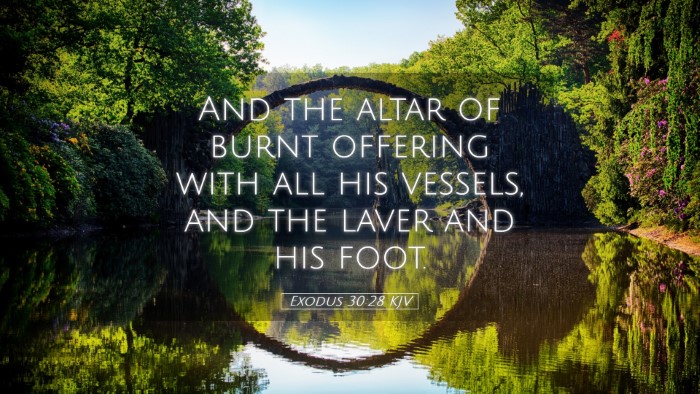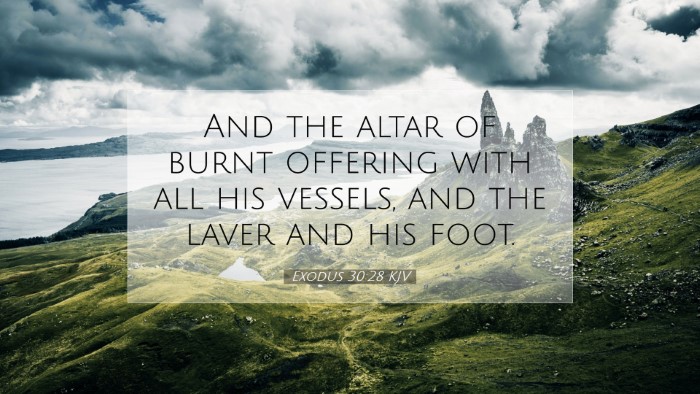Exodus 30:28 - Bible Commentary
Verse: "And the altar of burnt offering with all his vessels, and the laver and his foot."
This verse emphasizes the significance of specific items used in the Tabernacle, showcasing how God prescribed particular implements for worship. The items mentioned—the altar of burnt offering and the laver—serve not just practical purposes, but also symbolize deeper spiritual truths.
Insights from Public Domain Commentaries
Matthew Henry's Commentary
Matthew Henry highlights that the altar of burnt offerings was essential for the sacrificial system instituted by God. He notes the importance of offerings in the worship life of Israel, understanding that they represent atonement for sin and communion with God.
- Symbol of Atonement: The burnt offering reflects the seriousness of sin and the need for atonement.
- Divine Arrangement: Henry stresses that the specifications given by God regarding the altar demonstrate His holiness and the respect due in worship.
- Preparation for Sacrifice: The use of the altar prepares the worshipper's heart, reminding them of the gravity of sin and the cost of reconciliation with God.
Albert Barnes' Notes on the Bible
Albert Barnes remarks that the description of the altar and the laver signifies the importance of purification before approaching God. He suggests that these items were operationally intertwined with the worship experience of the Israelites.
- Altars in Worship: The altar of burnt offerings served as a place of significant interaction with God, where believers presented their sacrifices.
- Purpose of the Laver: The laver emphasized the need for washing, which symbolizes purity, reflecting the inner condition required when one approaches the holy presence of God.
- Spiritual Lesson: Barnes points out that the physical act of presenting an offering has spiritual implications, as it requires a thoughtful relationship with God.
Adam Clarke's Commentary
Adam Clarke provides a thorough analysis of the practical aspects of the items mentioned. He notes that these objects were not merely functional; they were laden with spiritual significance.
- Divine Command: Clarke emphasizes that these items follow the heavenly pattern shown to Moses, highlighting their importance in maintaining divine order in worship.
- Foreshadowing Christ: The burnt offerings foreshadowed the ultimate sacrifice of Christ, emphasizing the necessity of bloodshed for redemption.
- The Role of the Laver: The laver symbolizes the need for sanctification, illustrating that all who serve must be clean—in heart and in practice.
The Theological Significance
This verse encapsulates essential elements of Old Testament worship that are revelatory of New Testament truth. Each implement signifies a step towards understanding atonement and holiness.
- Atonement through Sacrifice: The significance of the burnt offering points to the cost of sin and the need for an acceptable sacrifice.
- Holiness in Ministry: The laver demonstrates that physical purification must accompany spiritual preparation, reinforcing the moral imperative of holiness in serving God.
- Christ as the Fulfillment: Both the altar and the laver remind Christians of their need for Christ's redemptive work and ongoing sanctification.
Practical Applications for Pastors and Theologians
Understanding these elements offers vital lessons for present-day ministry:
- Teaching on Atonement: Pastors can emphasize Christ's sacrifice in preaching, using the altar's significance to deepen the understanding of redemption.
- Encouraging Spiritual Hygiene: Leaders should advocate for the necessity of spiritual purity and preparation among their congregations.
- Lead through God-ordained Structures: Emphasizing the importance of following scripture in worship and ministry structures helps maintain reverence and respect for God’s commands.
Conclusion
Exodus 30:28 serves as a microcosm of broader themes in Scripture concerning sacrifice, purity, and divine worship. It remains a potent reminder to believers of the foundational truths concerning approachability to God through the prescribed means outlined in His Word.


